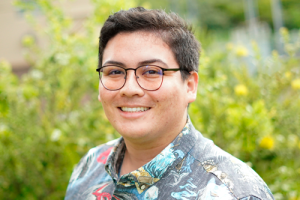JHU Helps Grad Amplify Voice in Conversations for Change
Published March 7, 2025
 Johns Hopkins MA in Government program graduate Michael Coloma Taylor speaks from the heart. And because his heart is forever connected to his home of Hawaiʻi, he infuses ʻŌlelo Hawaiʻi, the indigenous and official language of the state, into his daily correspondences and interactions.
Johns Hopkins MA in Government program graduate Michael Coloma Taylor speaks from the heart. And because his heart is forever connected to his home of Hawaiʻi, he infuses ʻŌlelo Hawaiʻi, the indigenous and official language of the state, into his daily correspondences and interactions.
Taylor, the son of an American father and a Filipino mother, has dedicated years to learning the language and has embraced the motto of the College of Hawaiian Language at his alma mater – the University of Hawaiʻi at Hilo – ʻO ka ʻŌlelo ke Kaʻā o ka Mauli. Language is the fiber that binds you to your culture.
“For me, being from Hawaiʻi and being Hawaiian are two completely different things,” said Taylor who works as a staff assistant to the president at the East-West Center in Honolulu, an independent, public, nonprofit organization that works – through education, research, training, and diplomacy – to address expressed needs in the Indo-Pacific Region. The Center is celebrating its 65th anniversary this year. “Even though I am not Native Hawaiian, I would live and die for the place where I grew up. Where you are from is so deeply engrained into your identity.”
Taylor feels so strongly about his identity that he devoted his Hopkins’ thesis to the importance of giving voice to people who can speak to the struggles of the Native Hawaiian community.
“I took the advice of the Center’s Vice President, Dr. Satu Limaye, who also runs the East-West Center office in Washington, D.C. He told me, ‘Don’t write about what is relevant. Write about what you are passionate about and make it relevant.’ I was really inspired. I wanted to talk about Hawaiʻi, about the important conversations that we foster at the Center, and about what really matters to me. I focused on getting Native Hawaiian voices into Pacific dialogues, and I shared methods for incorporating these voices into regional organizations like the Pacific Islands Forum, without interfering with government rule and law.”
Taylor appreciates the opportunities that his JHU degree has created.
“I feel a sense of duty, particularly with my experience and now with my master’s, to use my expertise in policy, government, and political science to uplift an underrepresented community,” he said. “I recently was honored to present my thesis work, alongside two other Hopkins graduates, as part of panel on geopolitics at the East-West Center during our international graduate student conference. I welcomed the opportunity to talk about how Native Hawaiian voices can be further involved in the revitalized interest in the Pacific. It was truly an honor.”
Taylor, a first-generation student who earned his undergraduate degree in political science, is excited to venture to Baltimore in May for his commencement celebration. The journey will culminate with a meaningful full-circle moment.
“When I was in high school, I thought I would study neuroscience, and Johns Hopkins was my dream school,” he said. “I was ambitious, but did not get accepted and instead made the safe choice to enroll at the University of Hawaiʻi at Hilo. The psychology program leading into neuroscience was full, so I decided on political science and became heavily involved in student government. As a freshman, I was selected for an internship in the state office of U.S. Senator Brian Schatz in Honolulu. It was a crazy opportunity, and my love for political science and the social sciences just grew from there.”
Taylor jumped at a second chance at Johns Hopkins and was elated when he learned of his acceptance to graduate school. He tailored his master’s program into professional development and applied for courses that would directly benefit him in his current role – state policy courses so he could learn how to better advocate at the state level, legislative language and speechwriting courses that would be supplemental and impactful.
“I would have never guessed that something like AAP was available,” Taylor said. “It truly does work for the working professional. Hopkins has such an amazing network of leaders and opportunities, and I felt fortunate to be tapped into these resources and connected to incredible lecturers, researchers, and now alumni from across the globe. To be able to get a world-class education from home, without having to tear myself away from my roots and go to the East Coast for an extended period of time, has been an unreal experience. I am very appreciative.
“I have found that my passion, which started with an interest in neuroscience and how people’s brains work, really was just the desire to know how people work,” he said. “I am glad that I didn’t end up cutting people open and probing brains, and I’m glad that instead I get to do policy and research that impacts people’s lives. At the end of the day, I am glad, even though I am not a doctor, that I found my niche.
“Hauʻoli au i ka’u puka kula ana mai ke kulanui o Johns Hopkins, a haʻaheo ko’u mau makua iaʻu.”
I am happy for graduating from Johns Hopkins and that my parents are proud of me.
Please note: Michael Taylor began his work as a Community Liaison in the Honolulu Office of Senator Mazie Hirono (D-HI) in April. The opportunity allows him to blend his policy work with community advocacy. Pomaikia’i, Michael.
Attention: Students and Alumni
Are you a current AAP student or alumni and want to share your accomplishments?
Interested in pursuing a graduate degree at Johns Hopkins University?
Request information to learn more or apply here.